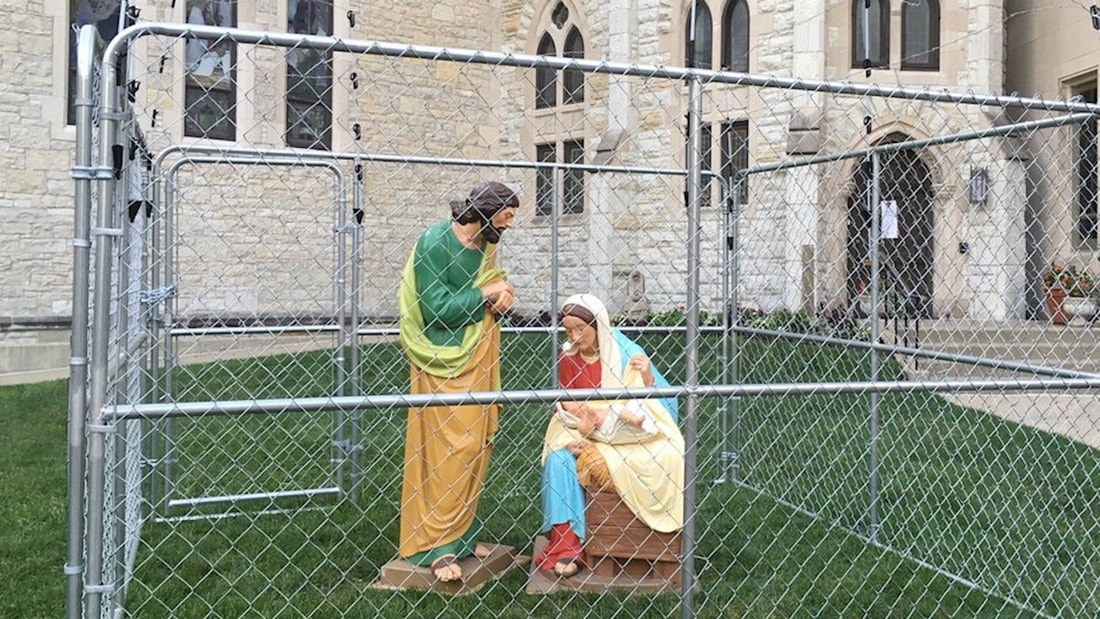Scott Anderson2 Samuel 7:1-11, 16 † Luke 1:46b-55 † Romans 16:25-27 † Luke 1:26-38
A video version of this sermon can be found here. Would it surprise you to know that this story from Second Samuel, this story of the victorious King David, now settled in his reign, now looking to build a permanent temple for God did not actually come together at a time when “the king was settled in his house and the LORD had given him rest from all his enemies around him”? Would it surprise you to know that it came about much later, during captivity in Babylon, when the temple that David’s son Solomon ultimately built for the LORD lay in ruins along with much of the civilization Israel had known at its peak, when the best and the brightest and the most privileged of Israel’s citizens had been forced to resettle as refugees in a foreign land? Would it surprise you to know that it came about when there was no rest, no house, and no king?[i] Perhaps it doesn’t surprise you. Perhaps it surprises you no more than knowing the story of Mary and the angel Gabriel was written down a full generation or two later, at a time when this one whose birth is foretold, this Jesus the Messiah had been executed as an enemy of the state and the church, and this miraculous child John, of the eighty-something year-old Elizabeth, had been beheaded, and when the very structure of Jewish life that serves as the backdrop to this story had been undercut, when there was once again no rest, no house, and no king. What is it about this hope of ours, that it seems to thrive when things are unfinished, that it seems to flourish most in trouble, in suffering, and in need? What is it about this mysterious faith of ours, that it is strongest, according to Romans, when revealed after long ages of being kept secret? What is it about this love of ours, that it is made perfect in weakness?
0 Comments
Scott AndersonIsaiah 61:1-4, 8-11 † Psalm 126 † 1 Thessalonians 5:16-24 † John 1:6-8, 19-28
A video version of this sermon can be found here. Just about every Christmas season I return to W. H. Auden’s Christmas long poem “For the Time Being.” I’m not entirely sure why. It isn’t a particularly efficient or even rewarding exercise even as I am drawn to sputtering along in my reading. I do suspect it holds a certain inspiration for me, or at least the promise of it that I am at any moment apt to tap into a reserve of insight and understanding. Perhaps my motivation is wrapped up in some faulty psychology that supposes because it is thick, because it is hard work to understand that it must be worth it. I do get that possibility, so you armchair psychologists can just sit on your hands for the moment. In fact, I think it is the other side of that psychological coin that has something more to do with this strange Advent season in this extraordinary “coronatide” time. It’s the audacity of this time that captures me. It’s the foolishness of this faith that imagines we can mobilize the machinery of the hope required to cut a path through mountains and valleys to make the way straight and wide, when it all seems so, well, not that, so anything, but passable. Foolish indeed. Faith, like love, is never easy. Scott AndersonIsaiah 9:2-6 † Hebrews 1:1-3a, 5-12 † Luke 2:1-20 It is not a secret, this story. It’s no mystery either under these stars, in this realm, in this moment. The simple truth of this night is that steadfast love is what holds us. Steadfast love is what promises a future in even the most uncertain times. Steadfast love is what turns any crisis, any unstable and dangerous instant into possibility and promise and salvation. This is not to say that suffering and death suddenly cease. It is not to say that tyrants have not and do not control more than they should. If anything, it anticipates that instability, suffering, and danger ramp up. This too, is surely obvious to any who care to pay attention to what happens to those who receive the shorthand designation “the least of these” in any given time.
Scott Anderson 2 Samuel 7:1-11, 16 † Psalm 89:1-4, 19-26 † Romans 16:25-27 † Luke 1:26-38
Would it surprise you to know that this story from Second Samuel, this story of the victorious King David, now settled in his reign, now looking to build a permanent temple for God, would it surprise you to know this passage did not actually come together at a time when “the king was settled in his house and the LORD had given him rest from all his enemies around him”? Would it surprise you to know that it came about much, much later, during captivity in Babylon, when the temple that David’s son Solomon ultimately built for the LORD lay in ruins along with much of the civilization Israel had known at its peak, when the best and the brightest and the most privileged of Israel’s citizens had been forced to resettle as refugees in a foreign land? Would it surprise you to know that it came about when there was no rest, no house, and no king?[i] Perhaps it doesn’t surprise you. Perhaps it surprises you no more than knowing the story of Mary and the angel Gabriel was written a full generation or two later at a time when this one whose birth is foretold, this Jesus the Messiah had been crucified on a wooden cross as an enemy of the state and a criminal, and this miraculous child John, of the octogenarian Elizabeth, had been beheaded, when the very structure of Jewish life that serves as the backdrop to this story had been undercut, when there was once again no rest, no house, and no king. What is it about this hope of ours, that it seems to thrive when things are unfinished, that it seems to thrive most in difficulty, in suffering, and in need? What is it about this faith of ours, that it is strongest, according to Romans, when disclosed after long ages of being kept secret? What is it about this love of ours, that it is made perfect in weakness? Maggie BreenReadings for this Sunday:
2 Samuel 18:5-9, 15, 31-33 | Psalm 130 | Ephesians 4:25-5:2 | John 6:35, 41-51 We have been reading this story of David all summer. Now I don’t know about you but I have had a hard time following along. I have grasped bits and pieces and been able to connect ideas here and there that are relevant to my life today, but overall I haven’t really been captivated by all that’s been going on. And this week as we jump six chapters ahead from where we left it last week to this story of Absalom, I have been left wondering why we are even reading this? |
St. Andrew SermonsCategories
All
|


 RSS Feed
RSS Feed